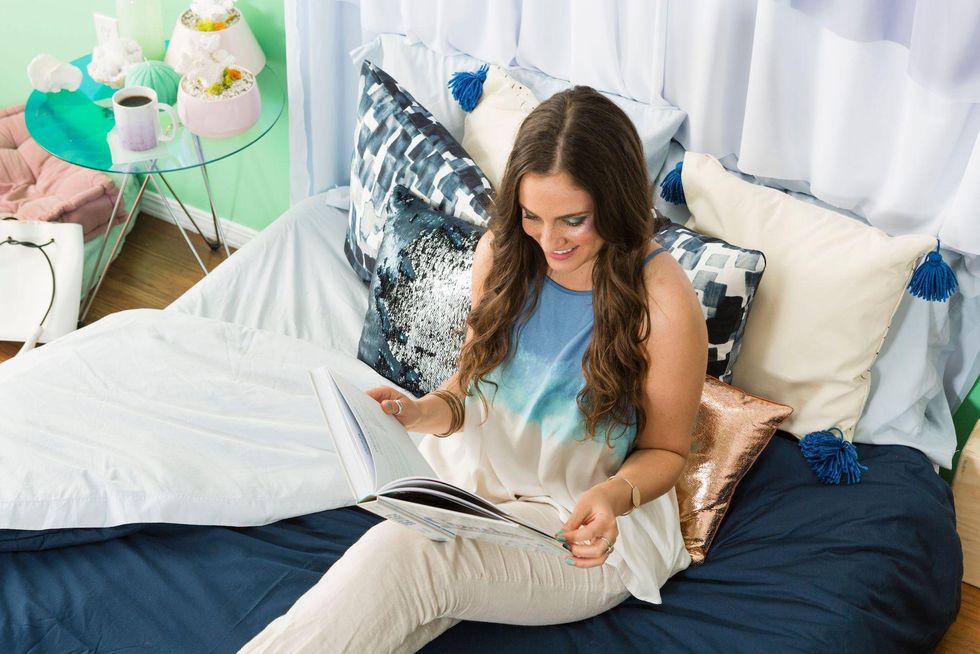Science says to slow down.
Why Monotasking Is Our Favorite New Productivity Tip

Theresa Gonzalez is a content creator based in San Francisco and the author of Sunday Sews. She's a lover of all things design and spends most of her days raising her daughter Matilda.
I used to pride myself on being able to juggle a bunch of tasks at once, and as a mom it's not only necessary, but impossible not to. But lately just reading a paperback without distraction or going for a walk without my phone brings me more joy while freeing my brain for more creativity. But here's a surprising productivity tip: Science shows that focusing on one task at a time is better for your brain. One Stanford study found that high-tech jugglers, those who are trying to do it all, retain very little of what they actually consume; and their memory and attention spans are less robust than those who focus on one task at a time.
I recently chatted with Thatcher Wine, author of The Twelve Monotasks, about ways in which we can slow down in order to get more done. From reading and listening to creating, eating, and sleeping, there's a science to how we can approach these tasks with focus and attention to ultimately do them better. Drawing on research in psychology, neuroscience, and mindfulness, Wine provides a roadmap for resisting all of the distractions we encounter in a day to bring a renewed focus on getting things done. Scroll for more tips from his new book.

What are the benefits of monotasking?
Wine: Monotasking can help us be more productive, less stressed, and more connected to other people. When we multitask, we make more mistakes and things take longer. Plus, constant multitasking tends to make us feel overwhelmed by how much we have to do. In contrast, monotasking provides satisfaction from doing one thing at a time with our full attention.
What are easy ways we can break free from multitasking?
The first thing we have to do is put down our phones and keep them out of reach. They are good at convincing us that we can and should multitask all the time. The second thing we can do is to do something every day that builds our ability to focus. I love to read for 20 minutes each morning. When you're feeling stressed out and have too much to do, I also recommend going for a walk for 20 minutes. Keep your phone in your pocket and monotask the walk, doing nothing but walking, paying attention to the sights and sounds, but resisting all temptations to multitask... this will help you reset and multitask less at your desk and in life.
How has technology played a role in our desire to multitask?
We invented all of these devices and technology over the past few decades and have built them to be faster and faster, and to multitask more and more. It's confusing to us that if the smartphones and computers we invented and configured can multitask, why can't we?
However, we have the same brains that humans have had for thousands of years, yet we are asking something different of them and are frustrated and overwhelmed when they can't keep up. Advertisers and technology companies have figured out how to get our attention with various notifications and rewards. They are constantly tempting us to multitask. The sooner we release that these are just distractions, the sooner we can reclaim control of our own attention to get done what we need and want to do.

Parents, especially moms, are overwhelmed with the tasks of childcare, navigating a pandemic, and work, plus finding time for themselves. What is your best advice for slowing down when it seems impossible to do so?
There is way more economic, cultural, and societal pressure to do more than ever before in the history of human beings. We've tried to keep up by doing more, and doing more than one thing at one time (multitasking). However, as a parent, I have found that I'm much better able to take care of my family, and myself, by slowing down and being present in every moment. It seems hard to do when we have so much on our to-do lists, and our kids need us and want our attention. However, we always have a choice with everything we do: we can do one thing with our full attention (monotasking), or we can do multiple things with partial attention (multitasking). The more we choose to monotask with our full attention, the more we'll get done, and the more our friends and family will value our presence and learn from our example.
What productivity tips will you prioritize in your day to day? Share with us @BritandCo!
















